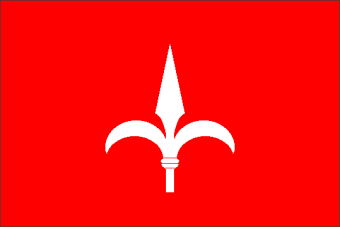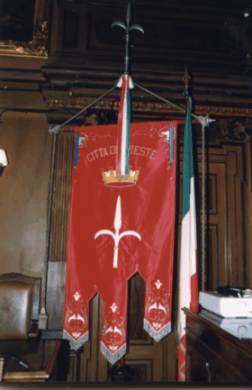 image
by Roberto Breschi from CISV
image
by Roberto Breschi from CISV
Last modified: 2013-01-12 by rob raeside
Keywords: italy | friuli-venezia giulia | trieste | spearhead | istria | free territory | spear | helberd |
Links: FOTW homepage |
search |
disclaimer and copyright |
write us |
mirrors
 image
by Roberto Breschi from CISV
image
by Roberto Breschi from CISV
See also:
Other Sites:
Trieste isn't a region but a town, the capital of the region
Friuli-Venezia Giulia, and also a province in this region. The
flag of Trieste as well as the flag of the former Free Territory
of Trieste, are plain red with the top of a lance in
white.The proportions I found are 7:10, but there could be other.
Pascal Vagnat, 22 September 1998
The exact name for the lance is "halberd" (in
Italian "alabarda"), like the lance used by the Vatican
Swiss Guard.
Paolo Zaccaria, 16 June 2000
According to my handy encyclopedia, the pole-arm whose head
appears on these Trieste flags is called a ranseur. A
halberd has an ax-head in place of one of the hooks
John Ayer, 5 October 2000
Although technically the Trieste's coat of arm should be named
ranseur rather than helberd, everybody in Trieste name
it "alabarda", i.e. helberd.
Paolo Zaccaria, 7 April 2005
 image
from <www.retecivica.trieste.it>,
located by Jarig Bakker , 27 February 2000
image
from <www.retecivica.trieste.it>,
located by Jarig Bakker , 27 February 2000
tr-01.gif) image
by Alex Belfi, 29 September 2000
image
by Alex Belfi, 29 September 2000
This is the coat of arms of Trieste, but it represented the
whole Trieste territory, which is the small region of which
Trieste is part, giving its name to it; so, i disagree with
Pascal Vagnat (on your site), who says that Trieste isn't a
region but a town, because actually it's both of them. This coat
of arms was the official coat of arms of the Free Territory of
Trieste as mentioned in the consitution of the FTT. It was mainly
used in Zone A. This coat of arms in not used officially today;
but it is commonly used as general identification for this
territory, and politically by independentists (i.e. people who
want to bring back the FTT).
Alex Belfi, 29 September 2000
" Trieste (Associazione per Trieste autonomy movement) -
North-East Italy." - Red field with a white spearhead.
This flag is listed under number 48 at the chart "Flags of
Aspirant Peoples" [eba94].
Ivan Sache
tr464.gif) image
by Paolo Zaccaria, 16 June 2000
image
by Paolo Zaccaria, 16 June 2000
From 1382 to 1918 Trieste was Austrian, so the previous flag
was a golden halberd on an Austrian flag (red/white/red
horizontal stripes).
The coat of arms of the town was similar and was confered by the
emperor Friedrich III of Habsburg in 1464. Here is a scan of a
more recent copy of the conferal document, dated 1691 and
conserved in the Trieste's library.
Paolo Zaccaria, 16 June 2000
tr-4f.gif) image
by Alex Belfi, 29 September 2000
image
by Alex Belfi, 29 September 2000
This coat of arms was used before World War II and most of the
times (and officially after 1933), it featured fasces.
Alex Belfi, 29 September 2000
Ströhl [stl04] describes the historical arms of Trieste:
Per fess: in chief Or,
the imperial eagle Sable; in base Gules, a fess Argent, overall an halberd
Argent (see image).
Granted 22 February 1464
by Emperor Frederick III, reconfirmed 26 February 1852 by Emperor Francis Joseph
I.
So Strohl takes the "historical" arms and therefore also the "traditional"
flag to be of post-1918 origin, i.e. had been introduced under Italian rule. Of
course the Italians were eager to remove the Austrian and imperial emblems in
the arms.
Marcus Schmöger, 9 August 2010
After reading Aldo Ziggioto's text [zig77d] it is more difficult:
1. The
halberd is of rather old, albeit unknown origin. Traditionally, it is considered
the lance of Saint Sergius (3rd century AD), but this legendary origin is
dismissed by Ziggioto.
2. He speculates that perhaps it might be a
fleur-de-lis originally.
3. He writes that it should properly be called "corsesca"
and not "alabarda" or "picca" or "partigiana".
4. At least there are a few
instances of this symbol's use on coins from 1280 and 1320-1330 as well as a
coin with gonfalone/labaro showing this as a finial, from 1234-1254.
5. In
the 14th century, finally, the halberd appears in a shield, so we might call it
the city arms. The colours are not clear at that time, though.
6. The first
regulation of the arms is the granting, already mentioned, in 1464, which shows
a much more complicated arms.
7. In 1818/1819 there was a project for a
modified arms, showing the halberd in a unicoloured red field (the upper part of
the arms remaining the same). However, this was finally not introduced as it
would have cost a tax of 400 florins.
8. So, the arms only changed after
Trieste became part of Italy in 1918. The official change only occurred on 3
July 1930, again changed in 1933 by addition of the chief with the fasces.
9.
Post-1945 details are not mentioned by Ziggioto.
Regarding the flag,
there are even more difficulties, because the sources are even scarcer than for
the arms:
1. Obviously the city flags mainly consisted of red in 1382, as red
cloth was procured for making three flags in that year.
2. Also in 1660 red
standards are mentioned without further details.
3. In 1749 the city flag
(without description) was abolished as ensign and the imperial one introduced.
4. A print from the late 18th century shows a three-striped flag
(dark-light-dark) flying from the castle of San Giusto.
5. Together with
descriptions of the "old flag" in 1818/1819 as being red-white-red with the city
arms in the center, Ziggioto infers that already for some time this design was
used. He also mentions the similar case of the Fiume (Rijeka) flag.
6. There
is one surviving old flag of Trieste, of unknown age; it is preserved at the
Armeria Reale di Torino (Cat. K. 107). It is 2.35 x 3.5 m in size, shows three
equal stripes (red-white-red) and in the center (overlapping into the red
stripes) the arms (mod. 1464), with a crown and some decorative things around
the oval shield; the halberd is silver instead of gold.
Marcus Schmöger,
9 August 2010